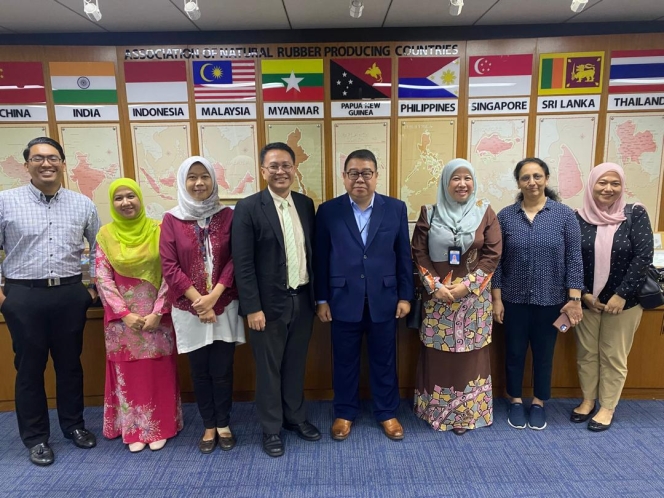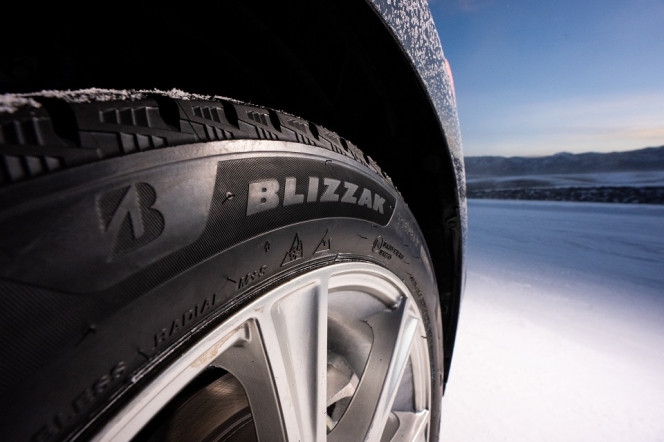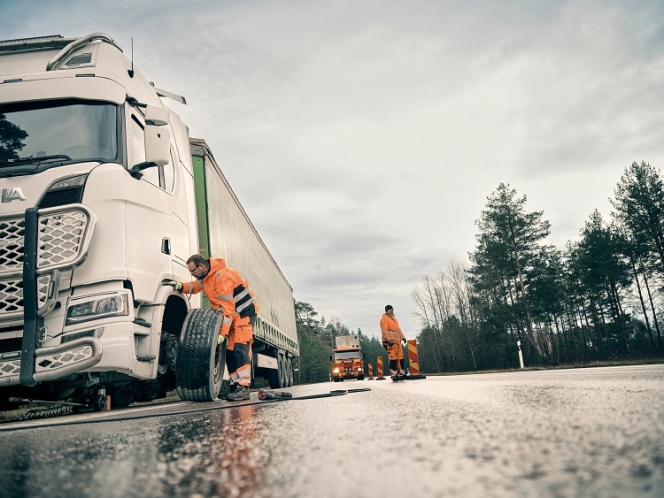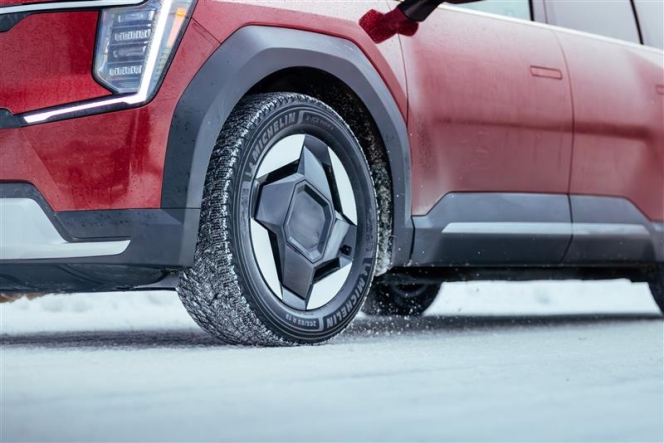Trelleborg Tires To Showcase Latest Tyre Solutions At ProMat 2025
- By TT News
- February 28, 2025

Trelleborg Tires is all set to display its latest tyre solutions at the upcoming ProMat 2025 event, which is scheduled to take place from 17-20 March in Chicago. The company will showcase its new compound technologies such as Pit Stop Line, ProTEX, ProEnergy and ProHD along with the entire rage of tyre solutions, from resilient and press-on to pneumatic tyres, at booth number S5135.
Trelleborg Tires will host a seminar titled ‘Elevating Material Handling Efficiency by Choosing the Right Tires’ on the opening day at Theatre H. The session will cover important topics such how choosing the proper tyres may save long-term expenses and greatly increase operating efficiency. On 18 March, Kevin Lawton, presenter of The New Warehouse Podcast, will conduct a live interview at Trelleborg Tires booth, where he will discuss how Trelleborg Tires address specific material handling needs.
Marc Margossian, Director – North American Business Development, Trelleborg Tires, said, “ProMat is an invaluable opportunity to engage with local partners and customers. We are excited to demonstrate how Trelleborg Tires’ advanced solutions can support North American businesses in enhancing operational efficiency, reducing costs and addressing the specific challenges of material handling. This year, our new compounds are designed to meet the evolving needs of the market, offering even greater value and performance to our customers.”
ANRPC Hosts Malaysian Rubber Delegation
- By TT News
- January 31, 2026

The Association of Natural Rubber Producing Countries (ANRPC) recently hosted a high-level delegation from the Rubber Development Division of the Ministry of Plantation and Commodities Malaysia at the ANRPC Secretariat. Led by Peter Dennis of Malaysia’s Rubber Development Division, the group met with ANRPC Secretary-General Dr Suttipong Angthong and his team.
The discussions centred on essential industry issues, particularly the vital importance of achieving stable rubber prices for the benefit of producers and the broader market. Conversations further delved into analysing recent market trends and their consequences for global production and trade dynamics.
This engagement highlighted the ongoing necessity for cooperative action to address sectoral challenges, advance sustainability and ensure resilient growth in the face of variable economic conditions.
Bridgestone Unveils Next-Gen Blizzak IcePeak Tyre With Dual Ice And Snow Certifications
- By TT News
- January 31, 2026

Bridgestone Americas has unveiled its latest flagship winter tyre, the Blizzak IcePeak, which will launch nationwide in May 2026. This new tyre is distinguished as the first from Bridgestone to achieve both the rigorous 3-Peak Mountain Snowflake and Ice Grip certifications, marking a significant advancement in winter performance. Designed to cater to a broad range of vehicles – including sedans, minivans, CUVs, SUVs and trucks – the IcePeak will replace the Blizzak WS90 and DM-V2 models. It will be available in 107 sizes, ultimately covering approximately 97 percent of the US light-duty vehicle market, with the majority of sizes ready at launch.
The tyre’s development centres on delivering superior winter traction alongside improved durability and efficiency, leveraging the company’s ENLITEN technology. This integration aims to lower rolling resistance for better fuel economy and extend tyre wear life, offering long-term cost savings for drivers. Internal testing indicates the IcePeak surpasses the wear life of its predecessors while maintaining effective traction. Its compatibility extends to conventional, hybrid and electric vehicles, emphasising its modern engineering.
Key to its performance is a suite of specialised technologies. Bridgestone’s patented MultiCell compound is engineered to enhance stopping power on ice, a claim validated by the official Ice Grip certification. This certification requires performance on ice to exceed a standard reference tyre by at least 18 percent in braking tests. For snow traction, the tyre employs optimised tread blocks and full-depth 3D sipes to create additional biting edges, helping vehicles gain grip and reduce spin.
Building upon the Blizzak lineage, which spans nearly four decades of innovation, the IcePeak introduces refined design elements. Its optimised compound is formulated for added durability across multiple winter seasons without sacrificing grip. A newly unified global tread pattern incorporates several critical features: strategically placed sipes are angled to maximise the gripping edge, protrusions on tread blocks prevent water intrusion on ice and micro-grooves help clear the thin water film that forms on icy surfaces. Together, these features aim to provide drivers with reliable control in wet, snowy and icy conditions, advancing the brand’s reputation for winter safety and performance.
Ian McKenney, Senior Product Manager, Bridgestone Americas, said, “Our Blizzak tyre lineup moves from strength to strength, continually raising the standard for impressive winter weather control. With the application of ENLITEN technology, we are able to expand the tyres’ performance envelope in all directions while also delivering greater durability and reduced rolling resistance, while promoting a focus on enhanced sustainability.”
Citira Rolls Out Nationwide 24/7 Tyre Breakdown Service For Swedish Fleets
- By TT News
- January 31, 2026

Citira, a circular tyre management provider, is introducing a nationwide emergency tyre service in Sweden for commercial fleets, a strategic move to become a comprehensive tyre management partner. Named Citira 24/7 Däckjour, it provides a dedicated contact point for heavy vehicle operators needing immediate assistance, day or night.
This service connects customers to an established, quality-assured network of professional tyre workshops across the country. By utilising pre-assembled replacement wheels ready for immediate deployment, the system ensures rapid on-site repairs to maximise vehicle uptime and minimise operational disruptions.

Clients also benefit from predictable, agreed-upon pricing and consolidated billing, which simplifies administration and enhances budget control. This integrated offering is designed to streamline daily operations, reduce downtime and deliver a more seamless support experience for truck and bus companies.
Göran Bengtsson, Head of Sales at Citira Sweden, said, “This is an important milestone for us to be to able offer our Swedish heavy vehicle fleet customers. This has been frequently requested to us, and we are happy to be able meet the demand, providing a new level of reliability and convenience for our customers.”
Michelin Unveils X-Ice Snow+ Tyre For Unpredictable Winters
- By TT News
- January 30, 2026

Michelin has unveiled the X-Ice Snow+ tyre, a premier winter product designed to meet the heightened demands of modern, unpredictable winter weather. This new offering provides increased performance and durability over its predecessor, specifically engineered to tackle severe seasonal challenges. Its advanced FLEX-ICE 3.0 tread compound optimises braking performance across a spectrum of conditions, including ice, snow and both wet and dry roads, ensuring reliable control during freezing rain or on treacherous black ice.
The tyre's proven tread design delivers superior start-up traction in deep snow compared to three leading competitors and offers strong lateral grip for stability on slick, icy corners. Beyond immediate safety, the X-Ice Snow+ is built for long-term value and efficiency. It achieves an extended tread life, lasting more than 26 percent longer than key rival tyres. Furthermore, through a specialised low-energy-loss compound that minimises rolling resistance, it delivers up to 34 percent better efficiency, which supports fuel savings and extends electric vehicle range without sacrificing winter traction. Passenger comfort is enhanced by proprietary Piano Acoustic Tuning Technology, a system engineered to reduce road noise for a quieter ride.
Available for dealer order starting in May 2026 for the winter selling season, the Michelin X-Ice Snow+ tyre will be produced in 15- to 23-inch sizes to accommodate a broad range of vehicles, including sedans, CUVs, SUVs, pickups and both hybrid and electric models.
Omer Waysman, Vice President – B2C Marketing, Michelin North America, Inc, said, “For more than 130 years, Michelin has continued to push the boundaries of innovation by improving our technologies to meet the needs of mobility across the globe. With the new Michelin X-Ice Snow+ tyre, we have taken everything drivers loved about the previous generation tyre and improved key areas. This new tyre delivers excellent winter performance, longer-lasting durability and greater efficiency, giving drivers a dependable advantage when the weather is at its worst.”







Comments (0)
ADD COMMENT